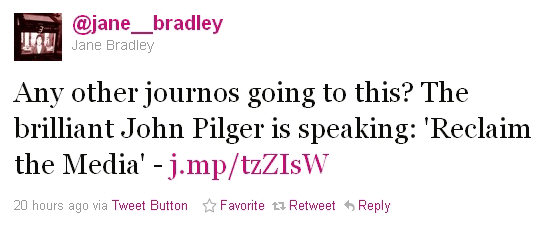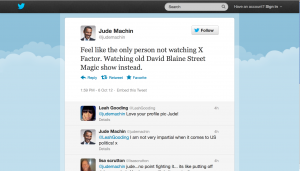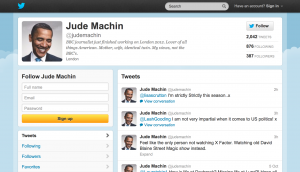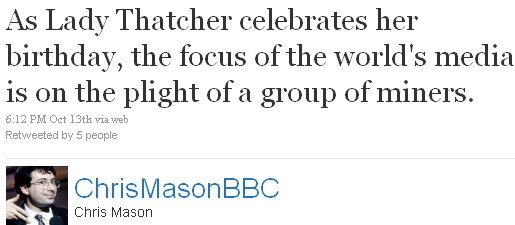As the President of the United States continues to fail in drumming up international support for bombing Syria, and the failure to win now-vital Congressional approval looms on the horizon, the BBC’s Mark Mardell is having a crisis of faith in which he reveals personal bias on the US, war, and the President. He also makes serious factual errors which reveal either his incompetence as a journalist or that a deep personal bias has clouded his judgment.
Syria crisis raises question of US role in the world
Right away, Mardell spells out his dilemma.
The president is clearing his desk, going all-out to persuade for a vote that he has said is vital for America’s credibility.
It is also a critical moment for American perception of itself as a power in the world. But in the details of the debate over Syria, the biggest questions and the larger picture are in danger of being lost.
In essence, it’s whether the world needs a super cop. And whether the US should simply assume that role.
I laughed out loud at this point. A little more than two years ago, back when the President was dithering deliberating over whether or not to send some humanitarian missiles at Libya, Mardell was engaged in contemplation of what he believed was the President’s internal personal struggle:
-
The tug between not wanting to be the world’s policeman and being the only guy with the gun and the muscle to stop a murder.
-
The whole-hearted desire to act in concert with other countries, and the realisation that implies going along with stuff they want to do and you don’t. (Being dragged into a war by the French, imagine.)
-
Not wanting to be out front when many world structures are designed in the expectation that like it or not, America will lead.
-
Intellectual appreciation that the ghost of Western colonialism is a powerful spirit never exorcised, and frustration that an untainted liberal interventionism hasn’t grown in other countries.
It took a long time for Mr Obama to decide to take action, and the route he has taken, a genuine commitment to acting with other nations with the US in the lead, has made for the appearance of more muddle. Now it is time for clarity.
How’s that working out now, Mark? Guess who demanded action first, and who’s our only ally now. Remember when Mardell was worried that the President had accidentally painted Himself into a corner with that “red line” business”? Just the other day, the President, like a child being asked who scribbled with crayons on the wall, told the world, “I didn’t didn’t set a red line: the world set a red line.” Now Mardell seems to have happily forgotten about his original concern and dutifully shifted blame away from Him. Trapped In A World He Never Made.
The BBC’s top analyst of US affairs has been consistent in his anti-war stance, his defense of the President, and in placing blame anywhere except on Him. Most recently, we saw Mardell in Ohio, reporting about a couple of town hall meetings held by a Congressman, where he found a way to blame George Bush, sort of. Hyper-partisan, intransigent Republicans currently in Washington also shared the blame. Any lack of trust in the President Himself seemed non-existent.
Notice that Mardell portrays Rep. Johnson as having been “unimpressed” by the Administration’s secret intelligence briefing simply because neither the President nor Vice President were there. He says that Johnson merely “had to wait a while to find out” about what the situation was with the chemical weapons, and solid evidence of an actual war plan. Mardell plays his skepticism as personal pettiness, not as a perhaps sincere objection based on legitimately reached opinion. In fact, here’s what Johnson actually said in a public statement, which Mardell would have been given:
“Given how important this Congressional briefing was for the President to make his case for taking military action in Syria, I was surprised that neither he, nor the Vice President, nor any cabinet level official was in attendance. The decision on whether or not to commit American troops and risk American lives when the United States is not directly threatened is a difficult one, and the President has the heavy burden of convincing the Congress and the American people of its merits. I left this afternoon’s briefing with more questions and concerns than I had when I arrived.”
Sure, he was surprised that nobody of any importance was there. But this appears to be a case where the President and His Administration demonstrated the contempt in which they hold Congress. This wasn’t a snub just at Johnson, it was a snub at all of them. And the bit I’ve bolded is rather important, don’t you think? And it’s not just Johnson who came away skeptical. Congress didn’t actually get satisfactory answers, and even top Democrats say so. Why would Mardell censor that piece of information? No wonder the President is now “clearing His desk”, as Mardell put it today.
Back to the Top Cop thing. Mardell goes on to explain what he sees as the two justifications being used for dropping a few bombs on Syria.
The first is national interest. Mr Obama says Syria does not pose an immediate threat to the US, but its willingness to use chemical weapons threatens its allies and bases in the region.
Less frequently his administration has suggested such weapons could fall into the hands of terrorists who could use them against America.
It is pretty obvious, the bigger the world power the more its vital interests may be harmed by something happening a long way away. If the whole Middle East is in uproar, it might not make a whole heap of difference to Paraguay or Latvia.
The argument for national interest is pretty clear. The desire to intervene for what you might call ‘moral reasons’, is far more murky.
Much of this is fair enough. It doesn’t take a genius to grasp the concepts. But why are moral reasons more murky? Because China and Russia don’t agree. No, really.
Mr Obama and even more forcefully Secretary of State John Kerry have said that the world can’t stand aside and witness such suffering. Particularly not when it breaches, if not international law, then international norms.
It is noticeable that it is senior politicians in the US, France and the UK who are keen on this argument of liberal interventionism. It is not just Russia that won’t go along with it. China won’t either.
On a recent trip there, I became convinced that this is fairly genuine. Academics and ordinary people find it baffling that America wants to impose its values on the rest of the world.
China forcefully repeats that it wants the denuclearisation of its ally North Korea. But it is reluctant to force the issue.
So we’re supposed to question Western moral values in this case because China is baffled by US imperialism? Oh, my goodness. On what other issues are we now supposed to back off now, Mark? Looks like he’s suffering from a little going native syndrome having spent a few weeks in China working on that documentary of his on how deeply entwined our national interests are and how China’s awesomeness may very well rescue the US economy (coming next Tuedsay on Radio 4 – can’t wait!).
Pardon me as I wipe the tears of laughter and dismay out of my eye. Mardell’s also saying that we could be wrong because we haven’t heard particularly loud demands to stop Assad from Brazil, Nigeria, or Japan, either. Well, Mugabe has been pretty silent, too. That’s me convinced. Are we in the world of adult, serious political discussion, or in the proverbial university bar? Hold that thought for later, actually.
So, we’ve gone from the President “accidentally” boxing Himself into a corner and being forced to act to save face, to Him blaming the world for boxing Him into a corner and being forced to act because of our high moral values, to questioning those moral values because they don’t come from Sweden. No, seriously:
I once put it to Tony Blair that the Iraq war might have been more credible if the call for action had come from Sweden. He made the obvious point: “Well, they couldn’t do it, could they?”
Now here’s where Mardell reveals his true bias on the larger issue:
Which makes me wonder about that old saying, “to a hammer, every problem is a nail”. In this case, you have to wonder why the hammer was forged in the first place.
Mardell’s not really old enough to be a child of the ’60s, but he sure is acting like the dippiest of hippies here. Why is there war, mommy? For heaven’s sake, Mark, why not quit the BBC and go to the nearest military base and start putting flowers in rifle barrels. How can anyone take this man seriously at this point?
Speaking of the ’60s, some people here may remember this little journey down the rabbit hole when Mardell was holding session at the BBC College of Journalism. His first reaction on landing in the US after being assigned to replace Justin Webb was, “What happened to the ’60s”? His real bias is on display here. In an attempt to explain himself, he continues:
The British developed their military to defend a globe-spanning empire. The US developed its military might to intervene in Europe and then to challenge the USSR.
The absence of the original purpose has not eliminated an instinct to intervene.
Maybe the word “imperialism” makes you think of arguments “that it is all about oil” or crude land grabs.
But those Victorian imperialists really did think they were bringing civilisation and Christianity, order and the rule of law to people who couldn’t climb to such dizzying heights on their own.
America’s belief in its own mission is more universal and not driven by racism, but there is a similar zealous enthusiasm to remake the rest of the world in its image.
No, there isn’t. This is pure anti-American drivel. And notice how this is suddenly about “America” again. Seems like every time the President does something Mardell or the BBC doesn’t like, He’s not mentioned, and it’s all about “America” as a whole acting unseemly. Is the President not involved? Wasn’t He elected to cure us of this demon? Nobody ‘s making Him do this. In any case, is that what we were doing when Clinton bombed the Serbs? How about when we removed Manuel Noriega from power? Grenada? Nobody in their right mind thought we were going to make Afghanistan into a modern, Western society. Dumbing down such complex situations and issues is silly, and betrays an ideological bias. Disagreeing with policy isn’t the same thing as demonizing it, but that’s what he’s doing here. Having Mark Mardell report on the US is like having St. Mark report on the Pharisees.
Of course, stopping the horror of chemical weapons is not the same as introducing democracy at the point of a gun.
But it raises the same question of who has the authority to make the judgment that norms have been violated, and who deals out the punishment.
Oh, does it now? I don’t know about people here, but I question the wisdom of listening to Russia and China and Nigeria on the issues of human rights. So, who has the authority?
The UN is meant to be the body that can order global cops into action. But the US says the Security Council is broken, because of the Russian veto.
You mean the Security Council which includes such moral heavyweights as Azerbaijan and Pakistan? The UN which for a while had Libya as the Chair of their Human Rights Council? With Venezuela and Qatar as members? These people are supposed to set moral standards for us all?
While the Russian action does look cynical, it is a bit like a prosecutor saying the jury system doesn’t work because he didn’t get a conviction.
You mean like so many Beeboids said after the Zimmerman verdict?
Or indeed, if David Cameron said parliament didn’t work because of the “no” vote.
Or indeed, if Mark Mardell said Congress didn’t work because they wouldn’t vote for something the President wanted.
President Obama understands how it looks to the rest of the world if the US goes it alone.
But, I thought…..
Mardell again:
It is why he was so reluctant to take the lead over Libya, why he was so slow to develop a Syria strategy.
No, it isn’t. This is where Mardell reveals not only his bias about the President, but even more of his own personal political beliefs. The President took so long to develop a strategy, and has been flailing around ever since He got caught up in His own smart-ass rhetoric, because He and His advisers actually had one all along – only it turned out to be completely, tragically, absurdly wrong.
Remarks by Ambassador Samantha Power, U.S. Permanent Representative to the United Nations, on Syria at the Center for American Progress, Washington D.C.
You all remember Samantha Power, right? She’s the President’s former foreign policy adviser who blamed the Jewish Lobby for criticism about His policies, then had to resign when she called Hillary Clinton “a monster” in an interview. After working for George Soros for a while, she was brought back into the fold and is now our voice at Mardell’s voice of morality, the UN. Here’s what she had to say to the far-Left Center for American Progress recently:
We worked with the UN to create a group of inspectors and then worked for more than six months to get them access to the country, on the logic that perhaps the presence of an investigative team in the country might deter future attacks. Or if not, at a minimum, we thought perhaps a shared evidentiary base could convince Russia or Iran – itself a victim of Saddam Hussein’s monstrous chemical weapons attacks in 1987-1988 – to cast loose a regime that was gassing its people. We expanded and accelerated our assistance to the Syrian opposition.
In other words, the President and his super-smart advisers are, just like Mardell, as naive as your average angry student debating world affairs in the university bar. This is just about the dumbest thing I’ve ever heard. And remember that last line about stepping up the help for the rebels for later.
Now we see that Mardell has been accidentally right, but wrong all along. The President wasn’t taking so long to develop a military strategy because He was worried about what the world would think. He was taking so long because He was working on another scheme entirely and never expected to need one. And then He thought He could get away with it, because He usually faces no consequences for anything. Just like He thought He could get away with that “red line” statement. How can Mardell not know this? He’s supposed to have been following the President’s every move closely, considering it all deeply and dutifully, researching, talking with experts, getting insider info. How can he have blown this so badly? Especially since this kind of naive negotiation is exactly the kind of thing he supports.
His bias has been driving his analysis. As I’ve maintained from the beginning, the President doesn’t have much interest or deep understanding of realpolitik and international affairs at this level. His ambitions and concerns have always been about domestic policies, domestic transformation. All these foreign issues are nuisances, distractions, things which should be delegated to various minions and apparatchiks. Where He does have opinions, they don’t seem to be very profound. And so we see here that the people doing it for Him share the most naive, ignorant views possible, and have accomplished precious little.
Why do you think we have less allies now after four years of Hillary Clinton as Sec. of State? And here’s another unasked, never mind unanswered question: If so much of the opposition to this war is due to Iraq fatigue, what about Libya? Why was Libya okay and now suddenly everyone is tired of war? That was even (illegal) regime change, he didn’t use unapproved weapons, and this is supposed to be some “proportional” limited bombing campaign.
What does “proportional” mean, anyway? Mardell isn’t interested. All he cares about is how the President looks now, and how He’ll look next week. It seems that the BBC’s North America editor’s job is not to really inform you properly about US issues, or about how the country works or what’s really going on, but how things affect the President. That’s why I often refer to him as the BBC’s US President editor.
Mardell’s journalism over the last five years has shown that his personal political ideology is very close to that of the President. This war campaign – as well as the one against Libya – is the only issue on which Mardell doesn’t approve. So he works to shift blame away from the President at every opportunity. And now he’s not only trying to analyze the situation around Him, he’s trying to figure out what the President can do to be successful. Is that really what the BBC is paying him to do?
Now about what Amb. Power said about accelerating assistance to the Syrian rebels. It’s really starting to look like this is all smoke and mirrors. As is obvious to everyone except Mardell by now, it’s impossible to think that a limited strike on a few military facilities will be the end of it. The President claims He’s not taking sides in the Syrian civil war here. He’s been very clear that this is about sending a message about killing lots of people in an unapproved method. I bet Ghaddafi’s ghost is wondering why the hell all this Iraq fatigue didn’t set in when it was his turn in the spotlight. But I digress.
Doing any real damage to Assad’s military capability is a de facto game changer in the civil war. It’s simply not credible to say that the military installations supposedly used to launch a rocket with a chemical warhead have no other purpose. I don’t mean specifically the rockets themselves which may already be armed with them, I’m talking about the larger picture. It’s impossible to believe that there can be some sort of surgical strikes so accurate that only the chemical weapons and a couple of rocket launchers will be hit. Any attack will limit Assad’s military capability, period, and it’s outrageous that we’re expected to believe that it won’t, and that any military action the US takes won’t affect – or isn’t meant to affect – the civil war. Of course it will.
Where’s Mardell’s astute analysis about that? He’s still caught up in the emotional world of teenage existential angst to notice. I’m trying not to take a position here about the rights or wrongs about taking sides or stopping Assad or regime change or what we should do next. I have opinions, obviously, but that’s not what this is about. This is about Mardell’s personal opinions coloring all his reporting and analysis in a way that makes his journalism unworthy of trusting or given much credence at all.
He’s not wondering about any of what I’ve just mentioned because he’s still stuck in his belief that The Obamessiah really is concerned only about chemical weapons, and truly doesn’t want to force regime change. We can see from Power’s speech that this simply isn’t true, that the US really is working to increase the chances of his downfall. So the President is essentially lying, Sec. of State Kerry is lying, and any BBC journalist who says the President doesn’t want to is either lying or just seriously deluded.
It’s either that, or the President and His entire Administration are a bunch of idiots and shouldn’t be trusted to run a nursery. Take your pick. In the end, this is a massive failure of BBC journalism. At your expense.
PS: Still no mention of His Nobel Prize for Peace. Come on, Mark, even Sweden has called Him on it.






 Screenshot because Kennedy deleted the tweets after Guido Fawkes linked to DB’s post on them and it gained wider attention. Same goes for this one:
Screenshot because Kennedy deleted the tweets after Guido Fawkes linked to DB’s post on them and it gained wider attention. Same goes for this one:  Dominic Laurie, Business presenter for Radio 5 Live
Dominic Laurie, Business presenter for Radio 5 Live This is the only Retweet in this collection, included here as evidence of the groupthink regarding Sarah Palin, and particularly the blood libel so many BBC journalists and other staff tried to push. Even one of the BBC’s experts in social media felt free to retweet such a thing. Now for an original tweet:
This is the only Retweet in this collection, included here as evidence of the groupthink regarding Sarah Palin, and particularly the blood libel so many BBC journalists and other staff tried to push. Even one of the BBC’s experts in social media felt free to retweet such a thing. Now for an original tweet:



 Allegra Stratton, Newsnight political editor
Allegra Stratton, Newsnight political editor
